Australia's Recycling Crisis: China's Ban and Systems Thinking
VerifiedAdded on 2023/01/16
|13
|3033
|66
Report
AI Summary
This report delves into the crisis faced by Australia's recycling industry following China's ban on foreign recycling waste. It introduces the concept of sustainability and the importance of systems thinking in addressing complex environmental challenges. The report examines the specific wicked problem of Australia's waste management crisis, highlighting the need for innovative solutions beyond conventional approaches like landfilling. It explores the application of systems thinking to reveal potential strategies, including waste reduction through consumer education and industry initiatives, the implementation of a waste hierarchy, and the development of local markets for recycled materials. The report also discusses various systems thinking approaches such as increasing domestic recycling capacity, improving the quality of collected recyclables, and implementing container deposit schemes. It concludes by emphasizing the need for a comprehensive range of short and long-term strategies to address the crisis, including a shift towards a circular economy and effectively funded plans for implementation. The report suggests the importance of moving beyond simply recycling and embracing higher levels of the waste management hierarchy.
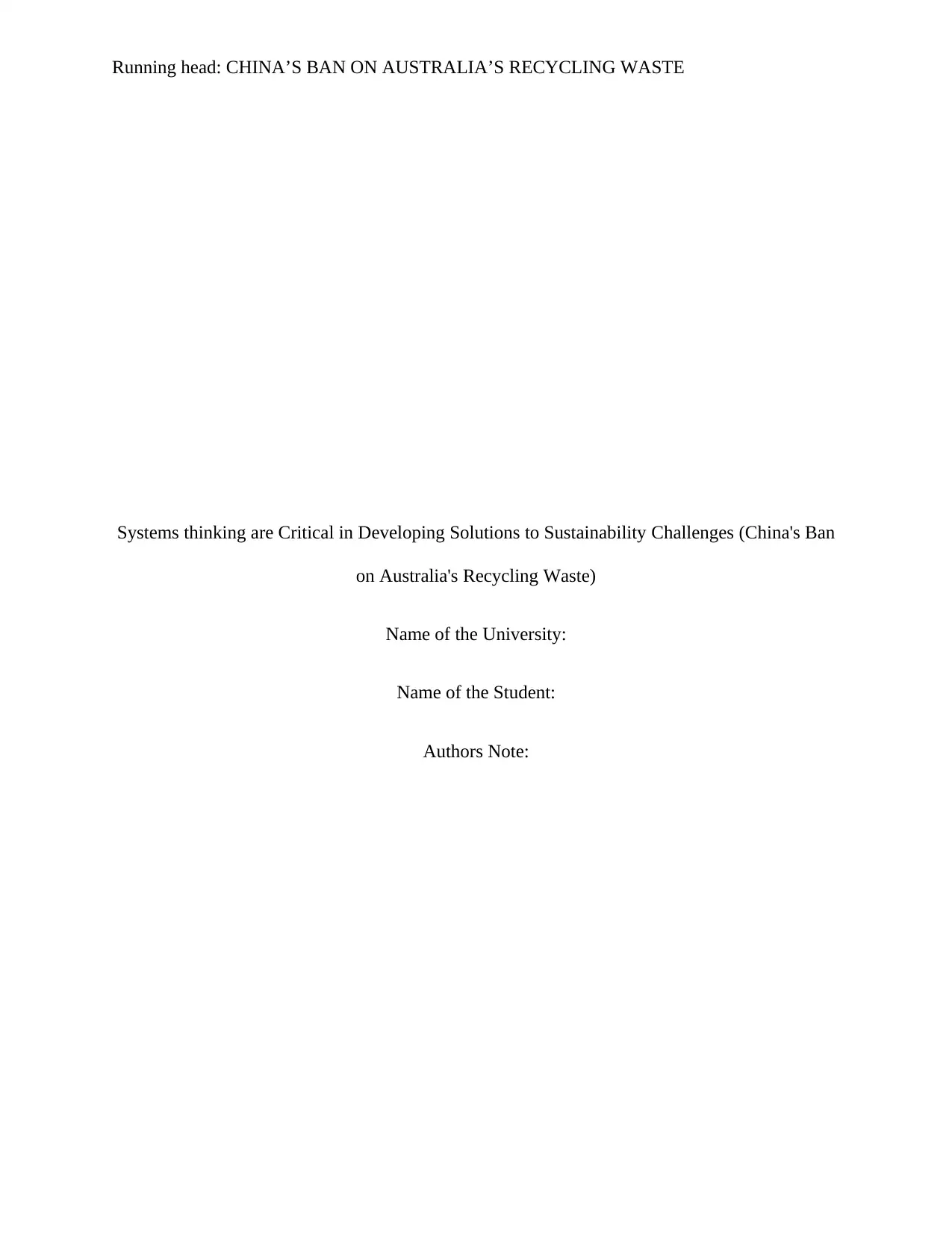
Running head: CHINA’S BAN ON AUSTRALIA’S RECYCLING WASTE
Systems thinking are Critical in Developing Solutions to Sustainability Challenges (China's Ban
on Australia's Recycling Waste)
Name of the University:
Name of the Student:
Authors Note:
Systems thinking are Critical in Developing Solutions to Sustainability Challenges (China's Ban
on Australia's Recycling Waste)
Name of the University:
Name of the Student:
Authors Note:
Paraphrase This Document
Need a fresh take? Get an instant paraphrase of this document with our AI Paraphraser
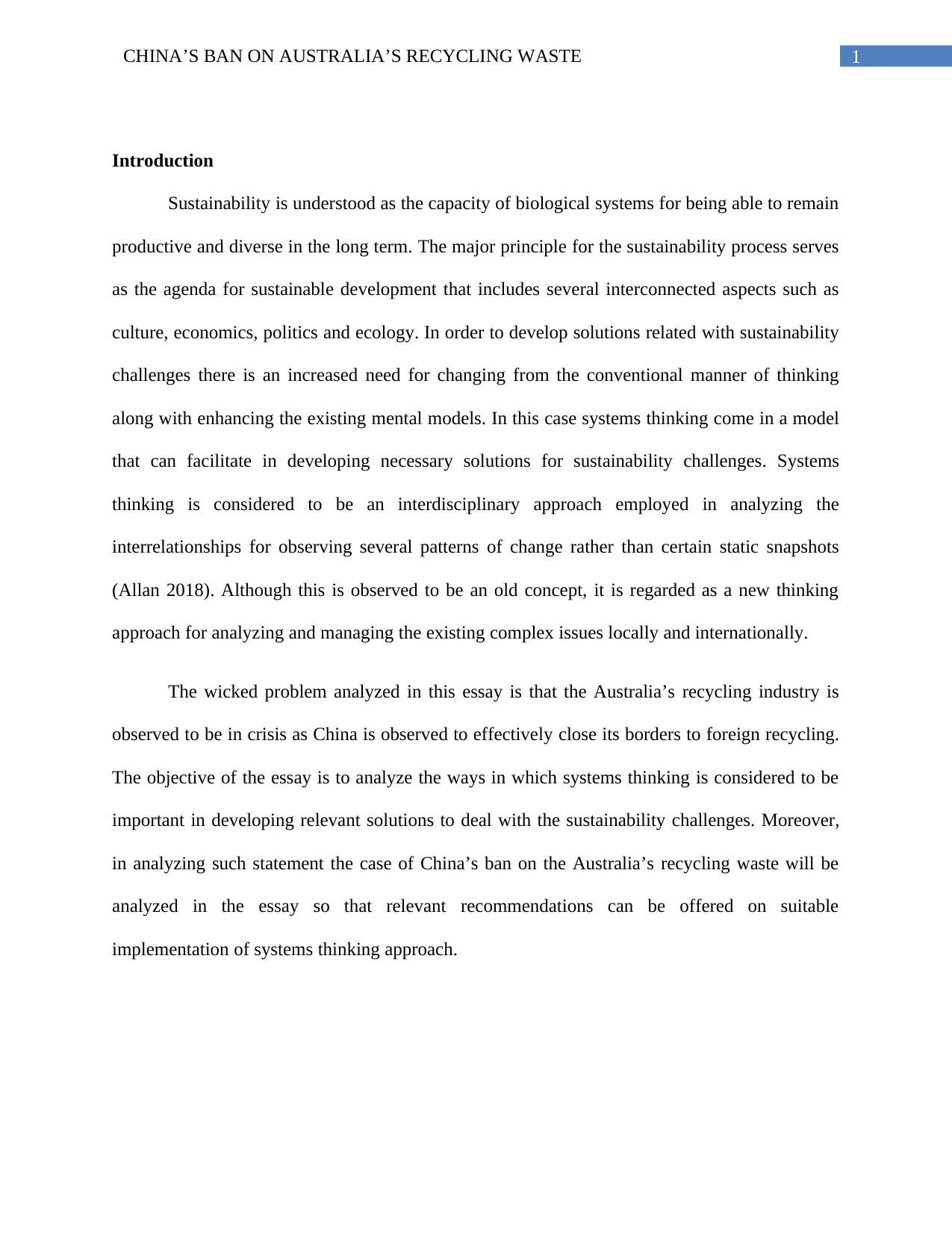
1CHINA’S BAN ON AUSTRALIA’S RECYCLING WASTE
Introduction
Sustainability is understood as the capacity of biological systems for being able to remain
productive and diverse in the long term. The major principle for the sustainability process serves
as the agenda for sustainable development that includes several interconnected aspects such as
culture, economics, politics and ecology. In order to develop solutions related with sustainability
challenges there is an increased need for changing from the conventional manner of thinking
along with enhancing the existing mental models. In this case systems thinking come in a model
that can facilitate in developing necessary solutions for sustainability challenges. Systems
thinking is considered to be an interdisciplinary approach employed in analyzing the
interrelationships for observing several patterns of change rather than certain static snapshots
(Allan 2018). Although this is observed to be an old concept, it is regarded as a new thinking
approach for analyzing and managing the existing complex issues locally and internationally.
The wicked problem analyzed in this essay is that the Australia’s recycling industry is
observed to be in crisis as China is observed to effectively close its borders to foreign recycling.
The objective of the essay is to analyze the ways in which systems thinking is considered to be
important in developing relevant solutions to deal with the sustainability challenges. Moreover,
in analyzing such statement the case of China’s ban on the Australia’s recycling waste will be
analyzed in the essay so that relevant recommendations can be offered on suitable
implementation of systems thinking approach.
Introduction
Sustainability is understood as the capacity of biological systems for being able to remain
productive and diverse in the long term. The major principle for the sustainability process serves
as the agenda for sustainable development that includes several interconnected aspects such as
culture, economics, politics and ecology. In order to develop solutions related with sustainability
challenges there is an increased need for changing from the conventional manner of thinking
along with enhancing the existing mental models. In this case systems thinking come in a model
that can facilitate in developing necessary solutions for sustainability challenges. Systems
thinking is considered to be an interdisciplinary approach employed in analyzing the
interrelationships for observing several patterns of change rather than certain static snapshots
(Allan 2018). Although this is observed to be an old concept, it is regarded as a new thinking
approach for analyzing and managing the existing complex issues locally and internationally.
The wicked problem analyzed in this essay is that the Australia’s recycling industry is
observed to be in crisis as China is observed to effectively close its borders to foreign recycling.
The objective of the essay is to analyze the ways in which systems thinking is considered to be
important in developing relevant solutions to deal with the sustainability challenges. Moreover,
in analyzing such statement the case of China’s ban on the Australia’s recycling waste will be
analyzed in the essay so that relevant recommendations can be offered on suitable
implementation of systems thinking approach.
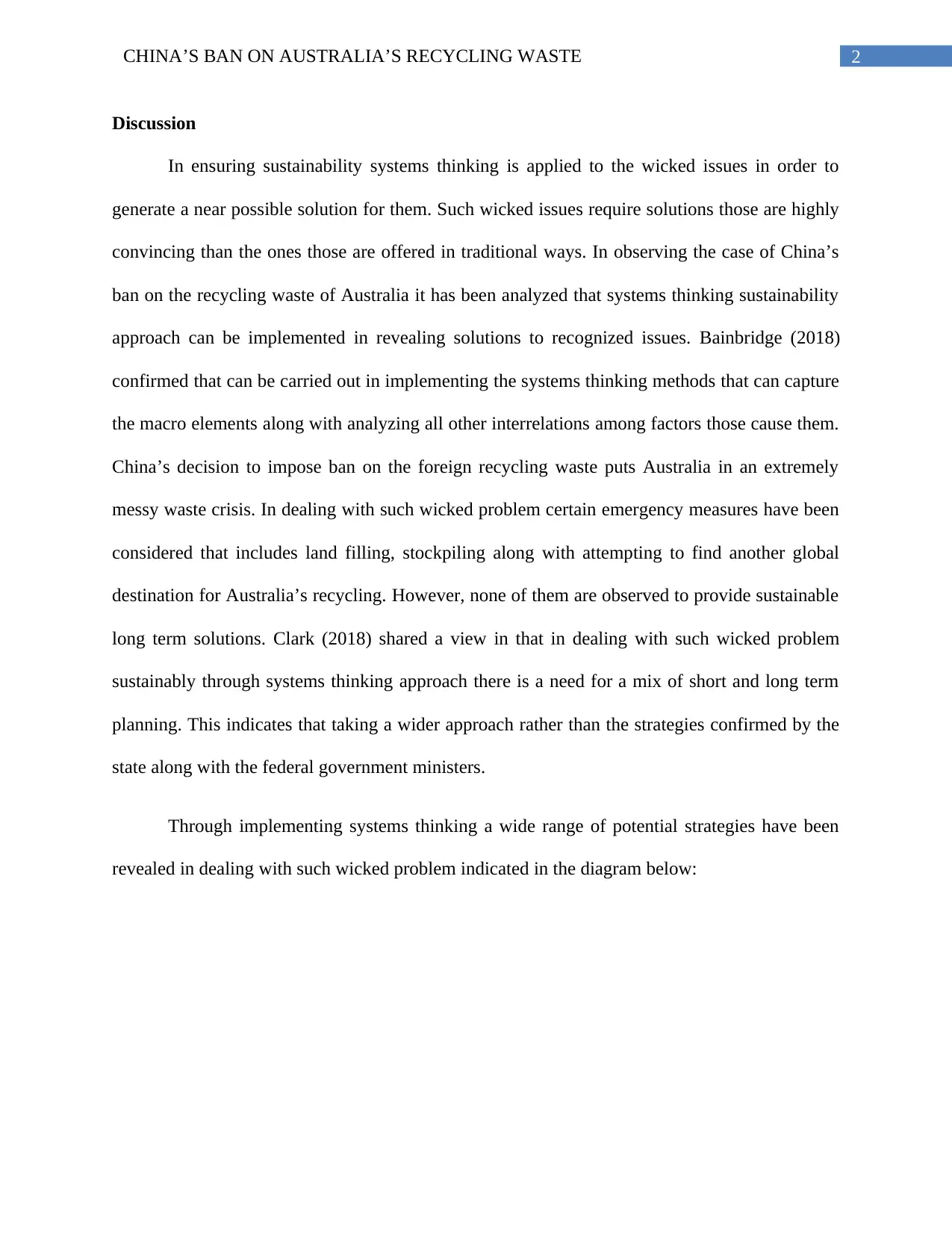
2CHINA’S BAN ON AUSTRALIA’S RECYCLING WASTE
Discussion
In ensuring sustainability systems thinking is applied to the wicked issues in order to
generate a near possible solution for them. Such wicked issues require solutions those are highly
convincing than the ones those are offered in traditional ways. In observing the case of China’s
ban on the recycling waste of Australia it has been analyzed that systems thinking sustainability
approach can be implemented in revealing solutions to recognized issues. Bainbridge (2018)
confirmed that can be carried out in implementing the systems thinking methods that can capture
the macro elements along with analyzing all other interrelations among factors those cause them.
China’s decision to impose ban on the foreign recycling waste puts Australia in an extremely
messy waste crisis. In dealing with such wicked problem certain emergency measures have been
considered that includes land filling, stockpiling along with attempting to find another global
destination for Australia’s recycling. However, none of them are observed to provide sustainable
long term solutions. Clark (2018) shared a view in that in dealing with such wicked problem
sustainably through systems thinking approach there is a need for a mix of short and long term
planning. This indicates that taking a wider approach rather than the strategies confirmed by the
state along with the federal government ministers.
Through implementing systems thinking a wide range of potential strategies have been
revealed in dealing with such wicked problem indicated in the diagram below:
Discussion
In ensuring sustainability systems thinking is applied to the wicked issues in order to
generate a near possible solution for them. Such wicked issues require solutions those are highly
convincing than the ones those are offered in traditional ways. In observing the case of China’s
ban on the recycling waste of Australia it has been analyzed that systems thinking sustainability
approach can be implemented in revealing solutions to recognized issues. Bainbridge (2018)
confirmed that can be carried out in implementing the systems thinking methods that can capture
the macro elements along with analyzing all other interrelations among factors those cause them.
China’s decision to impose ban on the foreign recycling waste puts Australia in an extremely
messy waste crisis. In dealing with such wicked problem certain emergency measures have been
considered that includes land filling, stockpiling along with attempting to find another global
destination for Australia’s recycling. However, none of them are observed to provide sustainable
long term solutions. Clark (2018) shared a view in that in dealing with such wicked problem
sustainably through systems thinking approach there is a need for a mix of short and long term
planning. This indicates that taking a wider approach rather than the strategies confirmed by the
state along with the federal government ministers.
Through implementing systems thinking a wide range of potential strategies have been
revealed in dealing with such wicked problem indicated in the diagram below:
⊘ This is a preview!⊘
Do you want full access?
Subscribe today to unlock all pages.

Trusted by 1+ million students worldwide
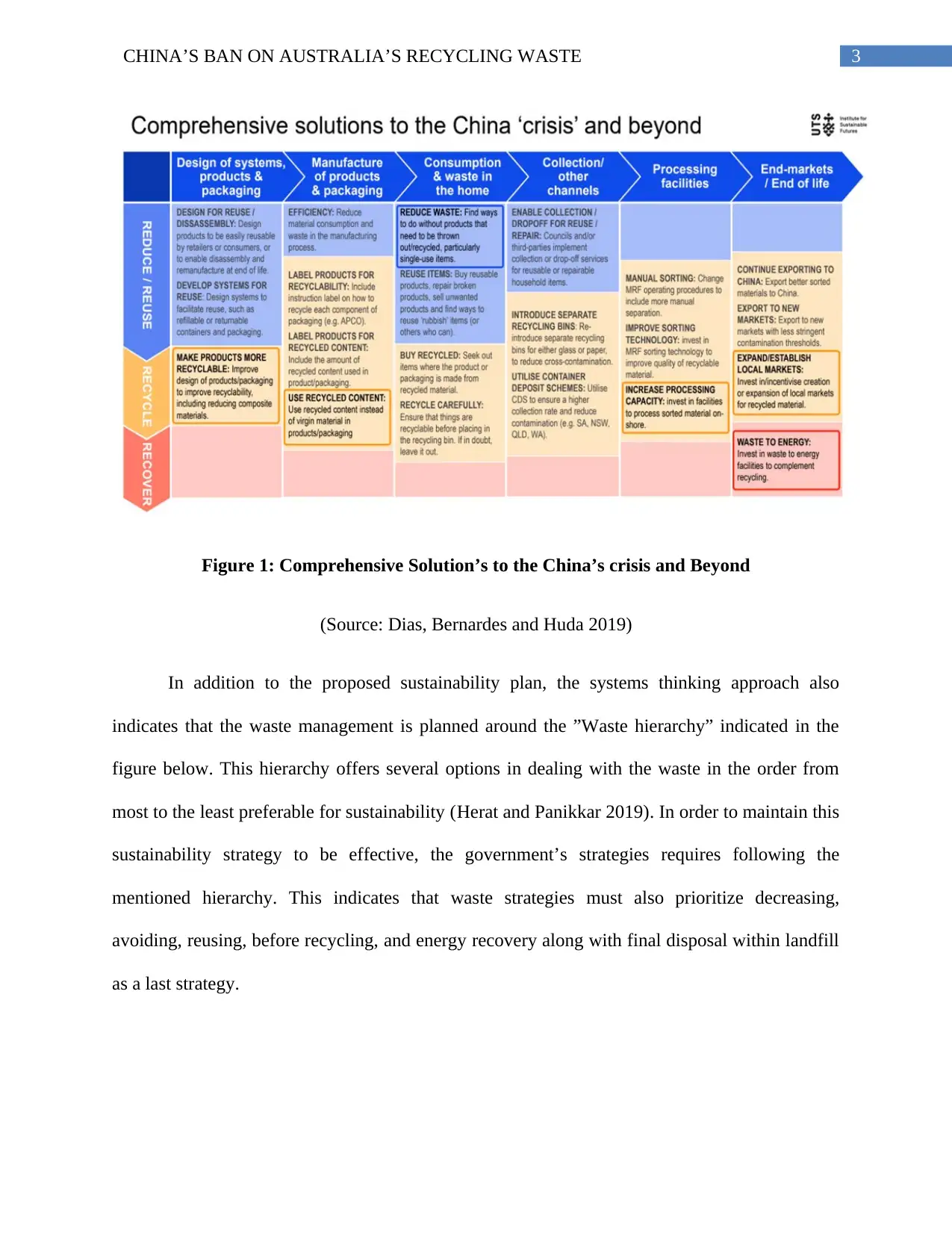
3CHINA’S BAN ON AUSTRALIA’S RECYCLING WASTE
Figure 1: Comprehensive Solution’s to the China’s crisis and Beyond
(Source: Dias, Bernardes and Huda 2019)
In addition to the proposed sustainability plan, the systems thinking approach also
indicates that the waste management is planned around the ”Waste hierarchy” indicated in the
figure below. This hierarchy offers several options in dealing with the waste in the order from
most to the least preferable for sustainability (Herat and Panikkar 2019). In order to maintain this
sustainability strategy to be effective, the government’s strategies requires following the
mentioned hierarchy. This indicates that waste strategies must also prioritize decreasing,
avoiding, reusing, before recycling, and energy recovery along with final disposal within landfill
as a last strategy.
Figure 1: Comprehensive Solution’s to the China’s crisis and Beyond
(Source: Dias, Bernardes and Huda 2019)
In addition to the proposed sustainability plan, the systems thinking approach also
indicates that the waste management is planned around the ”Waste hierarchy” indicated in the
figure below. This hierarchy offers several options in dealing with the waste in the order from
most to the least preferable for sustainability (Herat and Panikkar 2019). In order to maintain this
sustainability strategy to be effective, the government’s strategies requires following the
mentioned hierarchy. This indicates that waste strategies must also prioritize decreasing,
avoiding, reusing, before recycling, and energy recovery along with final disposal within landfill
as a last strategy.
Paraphrase This Document
Need a fresh take? Get an instant paraphrase of this document with our AI Paraphraser
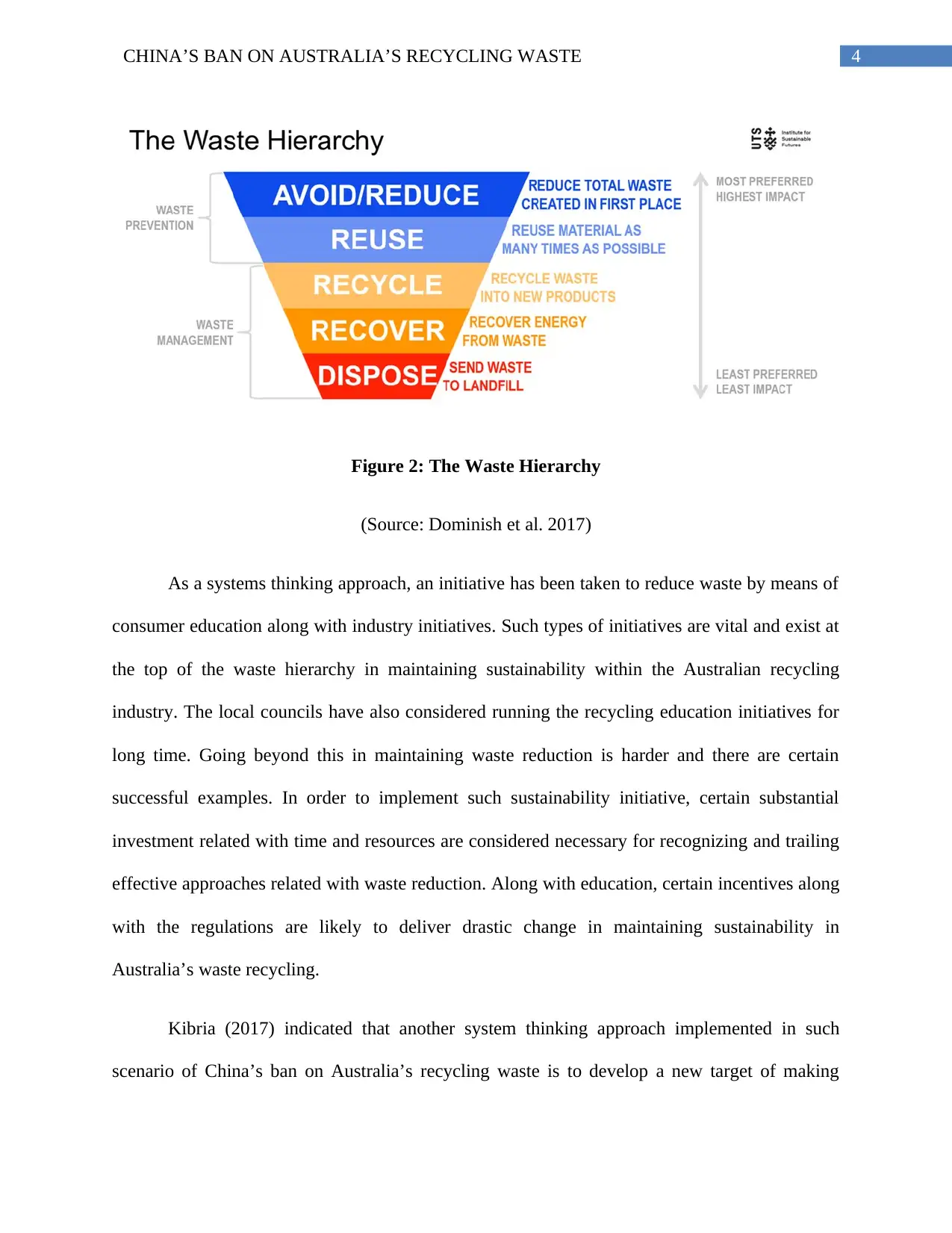
4CHINA’S BAN ON AUSTRALIA’S RECYCLING WASTE
Figure 2: The Waste Hierarchy
(Source: Dominish et al. 2017)
As a systems thinking approach, an initiative has been taken to reduce waste by means of
consumer education along with industry initiatives. Such types of initiatives are vital and exist at
the top of the waste hierarchy in maintaining sustainability within the Australian recycling
industry. The local councils have also considered running the recycling education initiatives for
long time. Going beyond this in maintaining waste reduction is harder and there are certain
successful examples. In order to implement such sustainability initiative, certain substantial
investment related with time and resources are considered necessary for recognizing and trailing
effective approaches related with waste reduction. Along with education, certain incentives along
with the regulations are likely to deliver drastic change in maintaining sustainability in
Australia’s waste recycling.
Kibria (2017) indicated that another system thinking approach implemented in such
scenario of China’s ban on Australia’s recycling waste is to develop a new target of making
Figure 2: The Waste Hierarchy
(Source: Dominish et al. 2017)
As a systems thinking approach, an initiative has been taken to reduce waste by means of
consumer education along with industry initiatives. Such types of initiatives are vital and exist at
the top of the waste hierarchy in maintaining sustainability within the Australian recycling
industry. The local councils have also considered running the recycling education initiatives for
long time. Going beyond this in maintaining waste reduction is harder and there are certain
successful examples. In order to implement such sustainability initiative, certain substantial
investment related with time and resources are considered necessary for recognizing and trailing
effective approaches related with waste reduction. Along with education, certain incentives along
with the regulations are likely to deliver drastic change in maintaining sustainability in
Australia’s waste recycling.
Kibria (2017) indicated that another system thinking approach implemented in such
scenario of China’s ban on Australia’s recycling waste is to develop a new target of making
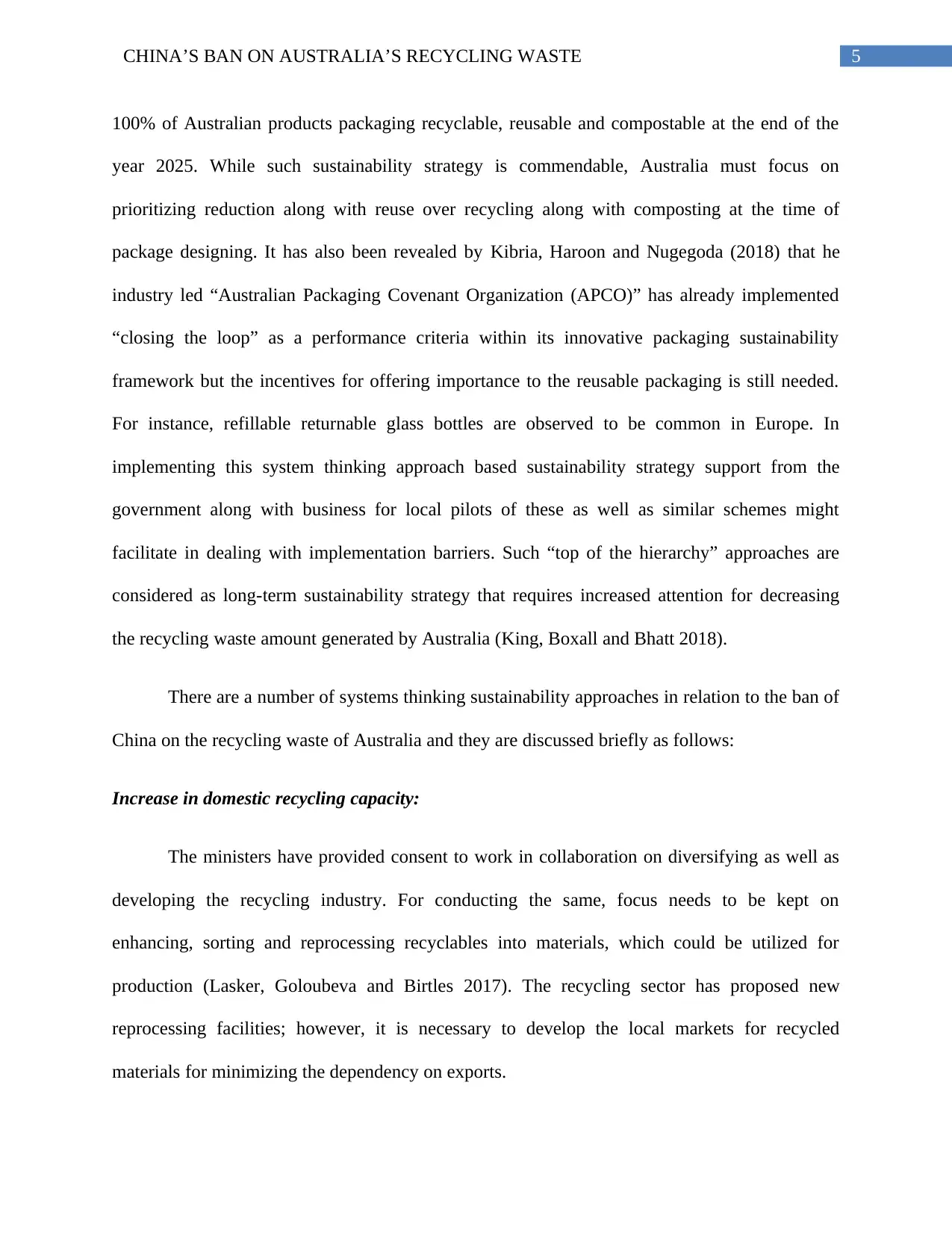
5CHINA’S BAN ON AUSTRALIA’S RECYCLING WASTE
100% of Australian products packaging recyclable, reusable and compostable at the end of the
year 2025. While such sustainability strategy is commendable, Australia must focus on
prioritizing reduction along with reuse over recycling along with composting at the time of
package designing. It has also been revealed by Kibria, Haroon and Nugegoda (2018) that he
industry led “Australian Packaging Covenant Organization (APCO)” has already implemented
“closing the loop” as a performance criteria within its innovative packaging sustainability
framework but the incentives for offering importance to the reusable packaging is still needed.
For instance, refillable returnable glass bottles are observed to be common in Europe. In
implementing this system thinking approach based sustainability strategy support from the
government along with business for local pilots of these as well as similar schemes might
facilitate in dealing with implementation barriers. Such “top of the hierarchy” approaches are
considered as long-term sustainability strategy that requires increased attention for decreasing
the recycling waste amount generated by Australia (King, Boxall and Bhatt 2018).
There are a number of systems thinking sustainability approaches in relation to the ban of
China on the recycling waste of Australia and they are discussed briefly as follows:
Increase in domestic recycling capacity:
The ministers have provided consent to work in collaboration on diversifying as well as
developing the recycling industry. For conducting the same, focus needs to be kept on
enhancing, sorting and reprocessing recyclables into materials, which could be utilized for
production (Lasker, Goloubeva and Birtles 2017). The recycling sector has proposed new
reprocessing facilities; however, it is necessary to develop the local markets for recycled
materials for minimizing the dependency on exports.
100% of Australian products packaging recyclable, reusable and compostable at the end of the
year 2025. While such sustainability strategy is commendable, Australia must focus on
prioritizing reduction along with reuse over recycling along with composting at the time of
package designing. It has also been revealed by Kibria, Haroon and Nugegoda (2018) that he
industry led “Australian Packaging Covenant Organization (APCO)” has already implemented
“closing the loop” as a performance criteria within its innovative packaging sustainability
framework but the incentives for offering importance to the reusable packaging is still needed.
For instance, refillable returnable glass bottles are observed to be common in Europe. In
implementing this system thinking approach based sustainability strategy support from the
government along with business for local pilots of these as well as similar schemes might
facilitate in dealing with implementation barriers. Such “top of the hierarchy” approaches are
considered as long-term sustainability strategy that requires increased attention for decreasing
the recycling waste amount generated by Australia (King, Boxall and Bhatt 2018).
There are a number of systems thinking sustainability approaches in relation to the ban of
China on the recycling waste of Australia and they are discussed briefly as follows:
Increase in domestic recycling capacity:
The ministers have provided consent to work in collaboration on diversifying as well as
developing the recycling industry. For conducting the same, focus needs to be kept on
enhancing, sorting and reprocessing recyclables into materials, which could be utilized for
production (Lasker, Goloubeva and Birtles 2017). The recycling sector has proposed new
reprocessing facilities; however, it is necessary to develop the local markets for recycled
materials for minimizing the dependency on exports.
⊘ This is a preview!⊘
Do you want full access?
Subscribe today to unlock all pages.

Trusted by 1+ million students worldwide
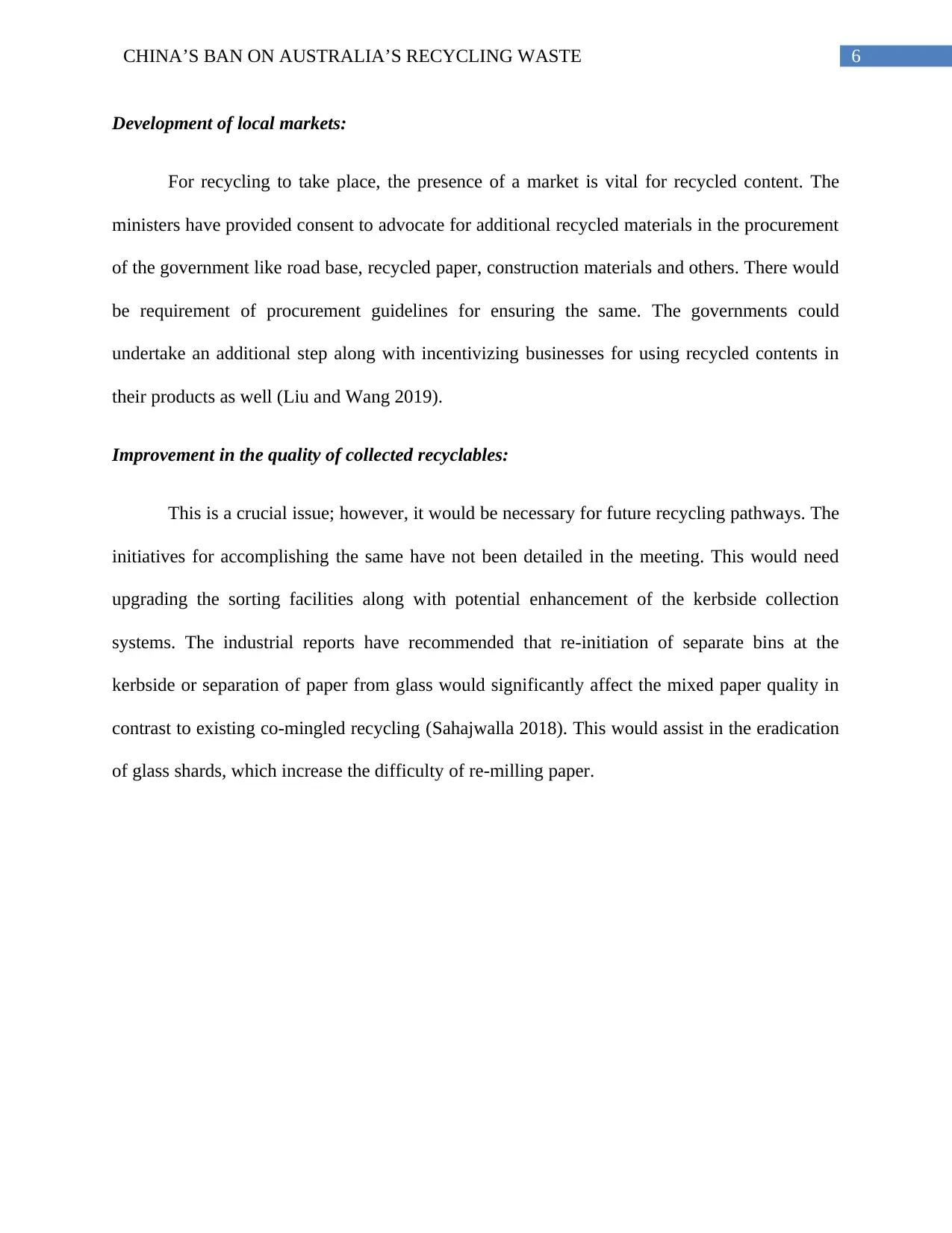
6CHINA’S BAN ON AUSTRALIA’S RECYCLING WASTE
Development of local markets:
For recycling to take place, the presence of a market is vital for recycled content. The
ministers have provided consent to advocate for additional recycled materials in the procurement
of the government like road base, recycled paper, construction materials and others. There would
be requirement of procurement guidelines for ensuring the same. The governments could
undertake an additional step along with incentivizing businesses for using recycled contents in
their products as well (Liu and Wang 2019).
Improvement in the quality of collected recyclables:
This is a crucial issue; however, it would be necessary for future recycling pathways. The
initiatives for accomplishing the same have not been detailed in the meeting. This would need
upgrading the sorting facilities along with potential enhancement of the kerbside collection
systems. The industrial reports have recommended that re-initiation of separate bins at the
kerbside or separation of paper from glass would significantly affect the mixed paper quality in
contrast to existing co-mingled recycling (Sahajwalla 2018). This would assist in the eradication
of glass shards, which increase the difficulty of re-milling paper.
Development of local markets:
For recycling to take place, the presence of a market is vital for recycled content. The
ministers have provided consent to advocate for additional recycled materials in the procurement
of the government like road base, recycled paper, construction materials and others. There would
be requirement of procurement guidelines for ensuring the same. The governments could
undertake an additional step along with incentivizing businesses for using recycled contents in
their products as well (Liu and Wang 2019).
Improvement in the quality of collected recyclables:
This is a crucial issue; however, it would be necessary for future recycling pathways. The
initiatives for accomplishing the same have not been detailed in the meeting. This would need
upgrading the sorting facilities along with potential enhancement of the kerbside collection
systems. The industrial reports have recommended that re-initiation of separate bins at the
kerbside or separation of paper from glass would significantly affect the mixed paper quality in
contrast to existing co-mingled recycling (Sahajwalla 2018). This would assist in the eradication
of glass shards, which increase the difficulty of re-milling paper.
Paraphrase This Document
Need a fresh take? Get an instant paraphrase of this document with our AI Paraphraser
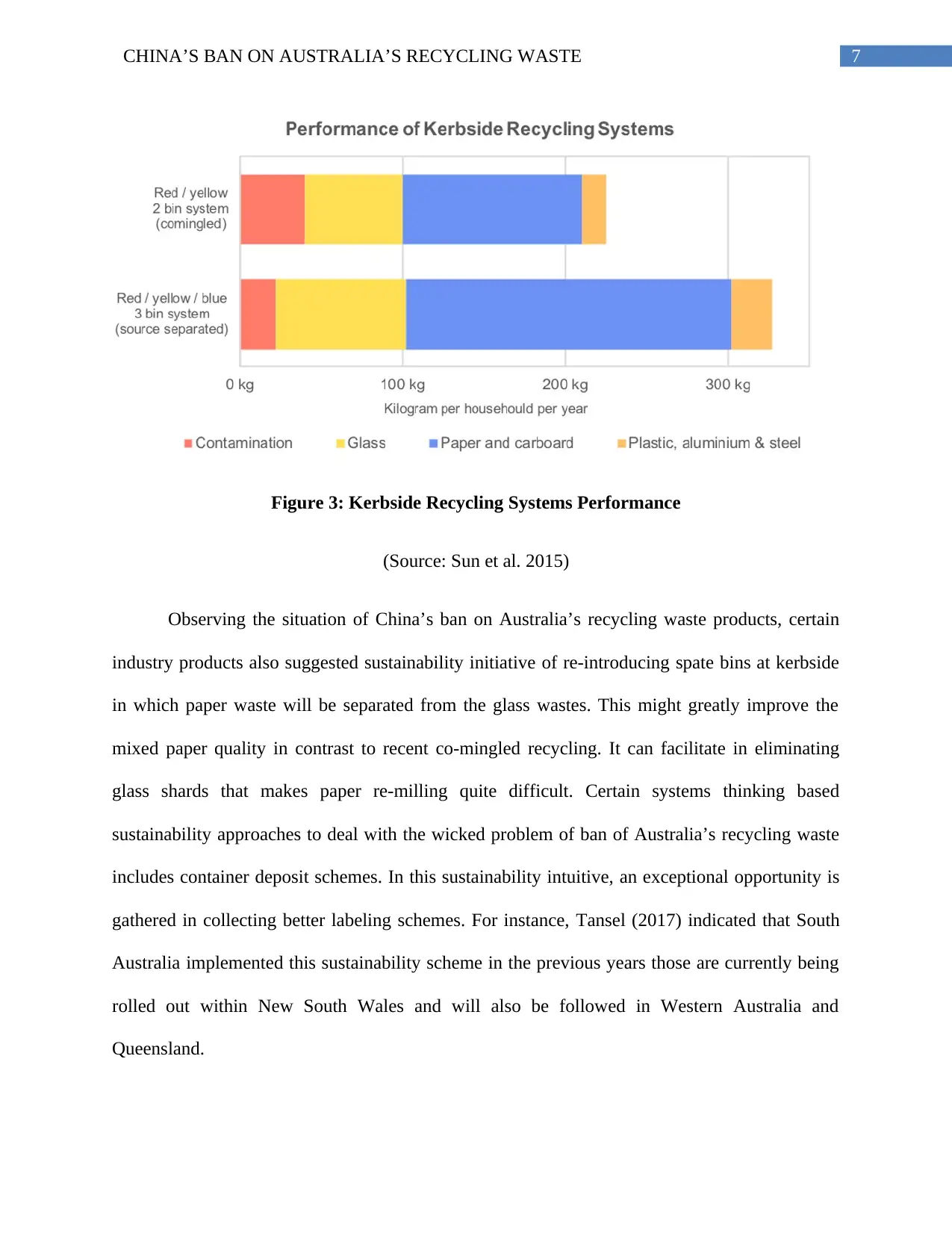
7CHINA’S BAN ON AUSTRALIA’S RECYCLING WASTE
Figure 3: Kerbside Recycling Systems Performance
(Source: Sun et al. 2015)
Observing the situation of China’s ban on Australia’s recycling waste products, certain
industry products also suggested sustainability initiative of re-introducing spate bins at kerbside
in which paper waste will be separated from the glass wastes. This might greatly improve the
mixed paper quality in contrast to recent co-mingled recycling. It can facilitate in eliminating
glass shards that makes paper re-milling quite difficult. Certain systems thinking based
sustainability approaches to deal with the wicked problem of ban of Australia’s recycling waste
includes container deposit schemes. In this sustainability intuitive, an exceptional opportunity is
gathered in collecting better labeling schemes. For instance, Tansel (2017) indicated that South
Australia implemented this sustainability scheme in the previous years those are currently being
rolled out within New South Wales and will also be followed in Western Australia and
Queensland.
Figure 3: Kerbside Recycling Systems Performance
(Source: Sun et al. 2015)
Observing the situation of China’s ban on Australia’s recycling waste products, certain
industry products also suggested sustainability initiative of re-introducing spate bins at kerbside
in which paper waste will be separated from the glass wastes. This might greatly improve the
mixed paper quality in contrast to recent co-mingled recycling. It can facilitate in eliminating
glass shards that makes paper re-milling quite difficult. Certain systems thinking based
sustainability approaches to deal with the wicked problem of ban of Australia’s recycling waste
includes container deposit schemes. In this sustainability intuitive, an exceptional opportunity is
gathered in collecting better labeling schemes. For instance, Tansel (2017) indicated that South
Australia implemented this sustainability scheme in the previous years those are currently being
rolled out within New South Wales and will also be followed in Western Australia and
Queensland.
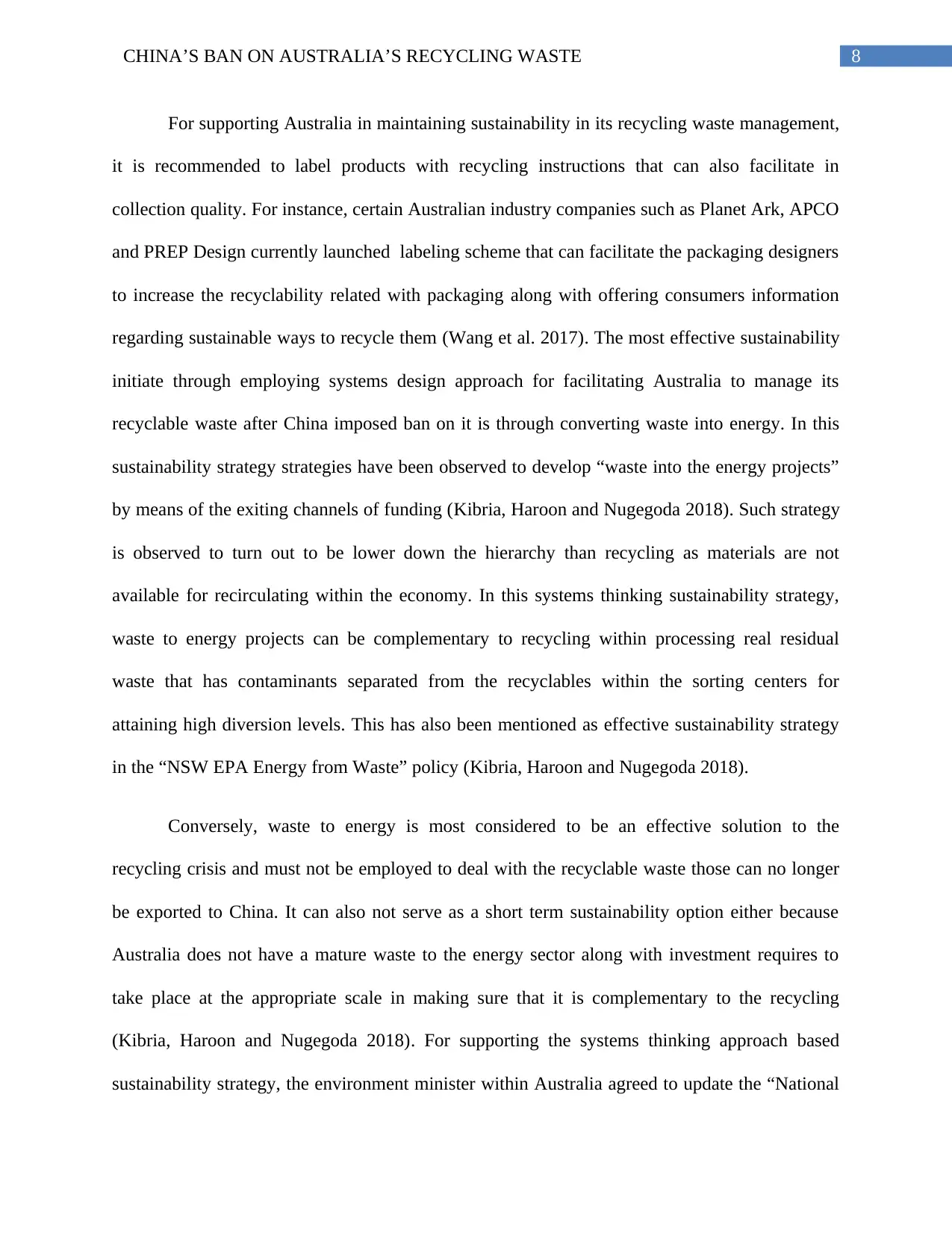
8CHINA’S BAN ON AUSTRALIA’S RECYCLING WASTE
For supporting Australia in maintaining sustainability in its recycling waste management,
it is recommended to label products with recycling instructions that can also facilitate in
collection quality. For instance, certain Australian industry companies such as Planet Ark, APCO
and PREP Design currently launched labeling scheme that can facilitate the packaging designers
to increase the recyclability related with packaging along with offering consumers information
regarding sustainable ways to recycle them (Wang et al. 2017). The most effective sustainability
initiate through employing systems design approach for facilitating Australia to manage its
recyclable waste after China imposed ban on it is through converting waste into energy. In this
sustainability strategy strategies have been observed to develop “waste into the energy projects”
by means of the exiting channels of funding (Kibria, Haroon and Nugegoda 2018). Such strategy
is observed to turn out to be lower down the hierarchy than recycling as materials are not
available for recirculating within the economy. In this systems thinking sustainability strategy,
waste to energy projects can be complementary to recycling within processing real residual
waste that has contaminants separated from the recyclables within the sorting centers for
attaining high diversion levels. This has also been mentioned as effective sustainability strategy
in the “NSW EPA Energy from Waste” policy (Kibria, Haroon and Nugegoda 2018).
Conversely, waste to energy is most considered to be an effective solution to the
recycling crisis and must not be employed to deal with the recyclable waste those can no longer
be exported to China. It can also not serve as a short term sustainability option either because
Australia does not have a mature waste to the energy sector along with investment requires to
take place at the appropriate scale in making sure that it is complementary to the recycling
(Kibria, Haroon and Nugegoda 2018). For supporting the systems thinking approach based
sustainability strategy, the environment minister within Australia agreed to update the “National
For supporting Australia in maintaining sustainability in its recycling waste management,
it is recommended to label products with recycling instructions that can also facilitate in
collection quality. For instance, certain Australian industry companies such as Planet Ark, APCO
and PREP Design currently launched labeling scheme that can facilitate the packaging designers
to increase the recyclability related with packaging along with offering consumers information
regarding sustainable ways to recycle them (Wang et al. 2017). The most effective sustainability
initiate through employing systems design approach for facilitating Australia to manage its
recyclable waste after China imposed ban on it is through converting waste into energy. In this
sustainability strategy strategies have been observed to develop “waste into the energy projects”
by means of the exiting channels of funding (Kibria, Haroon and Nugegoda 2018). Such strategy
is observed to turn out to be lower down the hierarchy than recycling as materials are not
available for recirculating within the economy. In this systems thinking sustainability strategy,
waste to energy projects can be complementary to recycling within processing real residual
waste that has contaminants separated from the recyclables within the sorting centers for
attaining high diversion levels. This has also been mentioned as effective sustainability strategy
in the “NSW EPA Energy from Waste” policy (Kibria, Haroon and Nugegoda 2018).
Conversely, waste to energy is most considered to be an effective solution to the
recycling crisis and must not be employed to deal with the recyclable waste those can no longer
be exported to China. It can also not serve as a short term sustainability option either because
Australia does not have a mature waste to the energy sector along with investment requires to
take place at the appropriate scale in making sure that it is complementary to the recycling
(Kibria, Haroon and Nugegoda 2018). For supporting the systems thinking approach based
sustainability strategy, the environment minister within Australia agreed to update the “National
⊘ This is a preview!⊘
Do you want full access?
Subscribe today to unlock all pages.

Trusted by 1+ million students worldwide
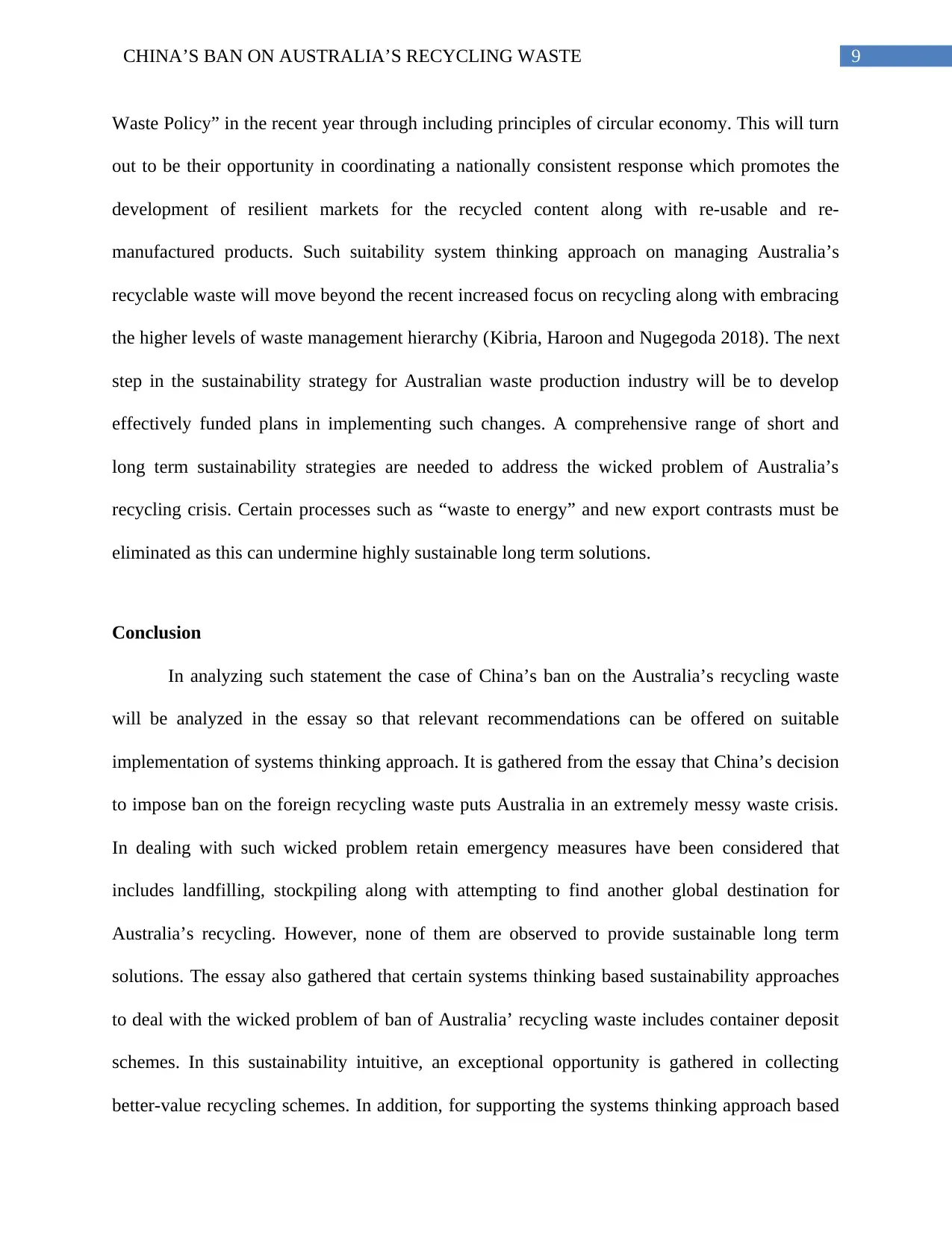
9CHINA’S BAN ON AUSTRALIA’S RECYCLING WASTE
Waste Policy” in the recent year through including principles of circular economy. This will turn
out to be their opportunity in coordinating a nationally consistent response which promotes the
development of resilient markets for the recycled content along with re-usable and re-
manufactured products. Such suitability system thinking approach on managing Australia’s
recyclable waste will move beyond the recent increased focus on recycling along with embracing
the higher levels of waste management hierarchy (Kibria, Haroon and Nugegoda 2018). The next
step in the sustainability strategy for Australian waste production industry will be to develop
effectively funded plans in implementing such changes. A comprehensive range of short and
long term sustainability strategies are needed to address the wicked problem of Australia’s
recycling crisis. Certain processes such as “waste to energy” and new export contrasts must be
eliminated as this can undermine highly sustainable long term solutions.
Conclusion
In analyzing such statement the case of China’s ban on the Australia’s recycling waste
will be analyzed in the essay so that relevant recommendations can be offered on suitable
implementation of systems thinking approach. It is gathered from the essay that China’s decision
to impose ban on the foreign recycling waste puts Australia in an extremely messy waste crisis.
In dealing with such wicked problem retain emergency measures have been considered that
includes landfilling, stockpiling along with attempting to find another global destination for
Australia’s recycling. However, none of them are observed to provide sustainable long term
solutions. The essay also gathered that certain systems thinking based sustainability approaches
to deal with the wicked problem of ban of Australia’ recycling waste includes container deposit
schemes. In this sustainability intuitive, an exceptional opportunity is gathered in collecting
better-value recycling schemes. In addition, for supporting the systems thinking approach based
Waste Policy” in the recent year through including principles of circular economy. This will turn
out to be their opportunity in coordinating a nationally consistent response which promotes the
development of resilient markets for the recycled content along with re-usable and re-
manufactured products. Such suitability system thinking approach on managing Australia’s
recyclable waste will move beyond the recent increased focus on recycling along with embracing
the higher levels of waste management hierarchy (Kibria, Haroon and Nugegoda 2018). The next
step in the sustainability strategy for Australian waste production industry will be to develop
effectively funded plans in implementing such changes. A comprehensive range of short and
long term sustainability strategies are needed to address the wicked problem of Australia’s
recycling crisis. Certain processes such as “waste to energy” and new export contrasts must be
eliminated as this can undermine highly sustainable long term solutions.
Conclusion
In analyzing such statement the case of China’s ban on the Australia’s recycling waste
will be analyzed in the essay so that relevant recommendations can be offered on suitable
implementation of systems thinking approach. It is gathered from the essay that China’s decision
to impose ban on the foreign recycling waste puts Australia in an extremely messy waste crisis.
In dealing with such wicked problem retain emergency measures have been considered that
includes landfilling, stockpiling along with attempting to find another global destination for
Australia’s recycling. However, none of them are observed to provide sustainable long term
solutions. The essay also gathered that certain systems thinking based sustainability approaches
to deal with the wicked problem of ban of Australia’ recycling waste includes container deposit
schemes. In this sustainability intuitive, an exceptional opportunity is gathered in collecting
better-value recycling schemes. In addition, for supporting the systems thinking approach based
Paraphrase This Document
Need a fresh take? Get an instant paraphrase of this document with our AI Paraphraser
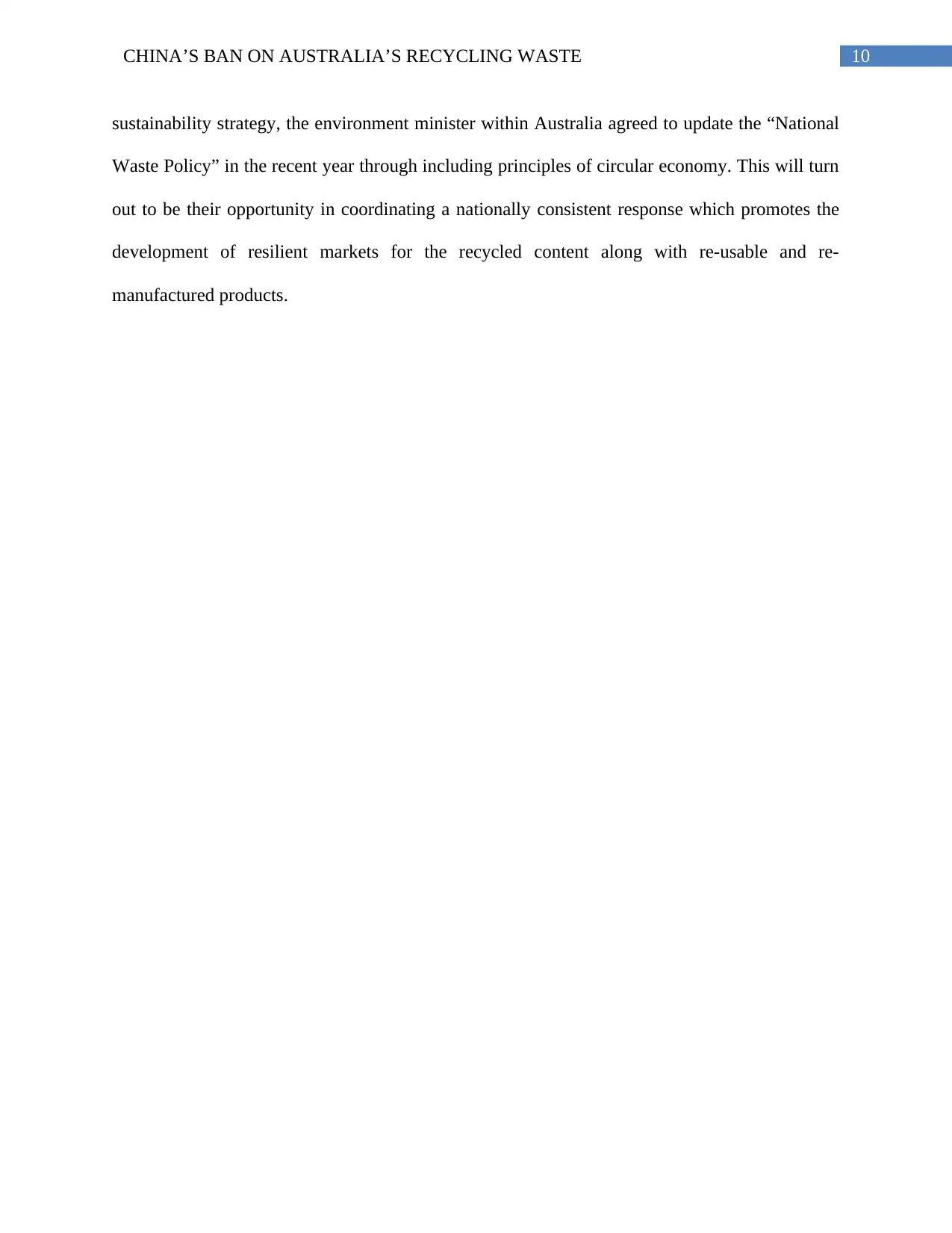
10CHINA’S BAN ON AUSTRALIA’S RECYCLING WASTE
sustainability strategy, the environment minister within Australia agreed to update the “National
Waste Policy” in the recent year through including principles of circular economy. This will turn
out to be their opportunity in coordinating a nationally consistent response which promotes the
development of resilient markets for the recycled content along with re-usable and re-
manufactured products.
sustainability strategy, the environment minister within Australia agreed to update the “National
Waste Policy” in the recent year through including principles of circular economy. This will turn
out to be their opportunity in coordinating a nationally consistent response which promotes the
development of resilient markets for the recycled content along with re-usable and re-
manufactured products.
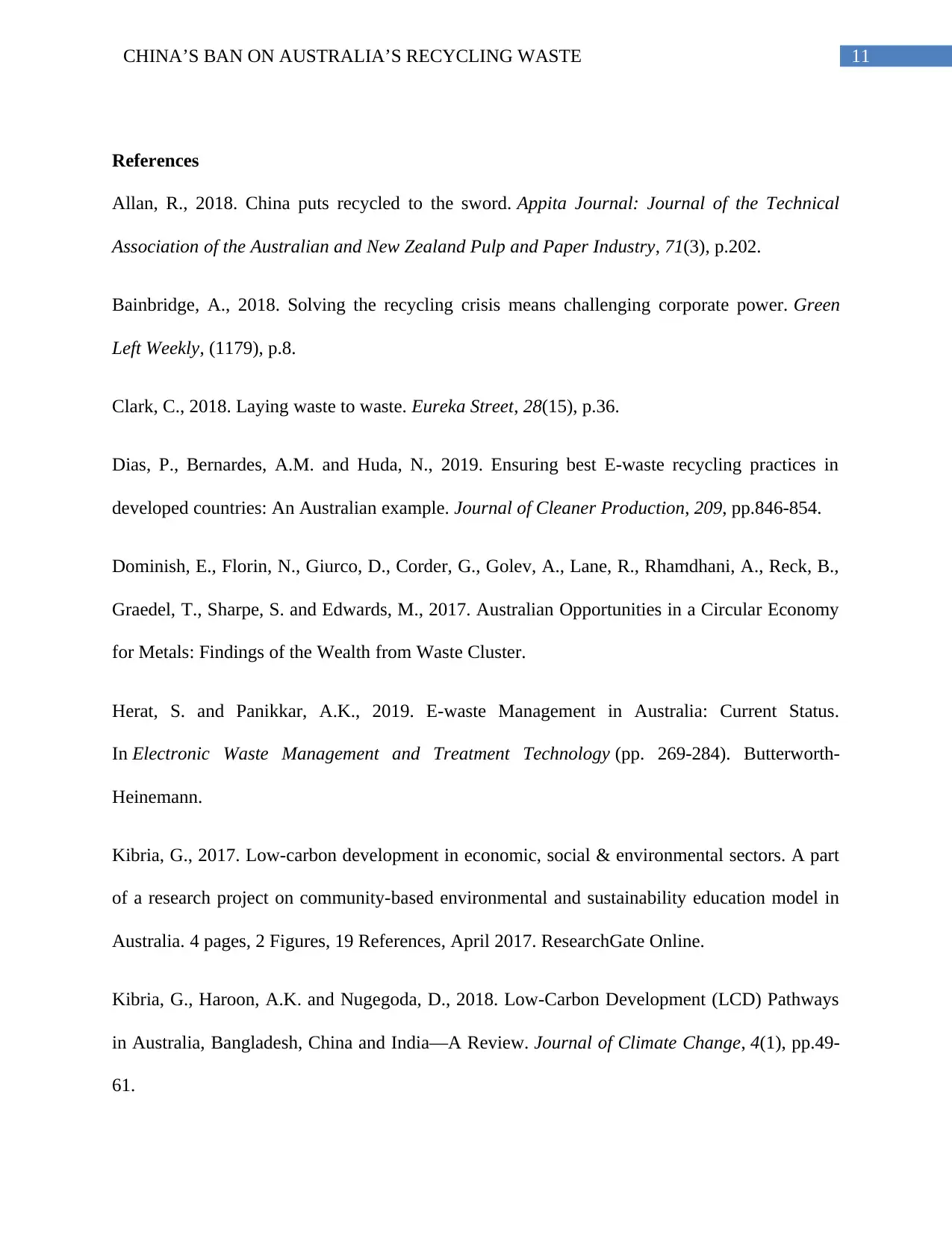
11CHINA’S BAN ON AUSTRALIA’S RECYCLING WASTE
References
Allan, R., 2018. China puts recycled to the sword. Appita Journal: Journal of the Technical
Association of the Australian and New Zealand Pulp and Paper Industry, 71(3), p.202.
Bainbridge, A., 2018. Solving the recycling crisis means challenging corporate power. Green
Left Weekly, (1179), p.8.
Clark, C., 2018. Laying waste to waste. Eureka Street, 28(15), p.36.
Dias, P., Bernardes, A.M. and Huda, N., 2019. Ensuring best E-waste recycling practices in
developed countries: An Australian example. Journal of Cleaner Production, 209, pp.846-854.
Dominish, E., Florin, N., Giurco, D., Corder, G., Golev, A., Lane, R., Rhamdhani, A., Reck, B.,
Graedel, T., Sharpe, S. and Edwards, M., 2017. Australian Opportunities in a Circular Economy
for Metals: Findings of the Wealth from Waste Cluster.
Herat, S. and Panikkar, A.K., 2019. E-waste Management in Australia: Current Status.
In Electronic Waste Management and Treatment Technology (pp. 269-284). Butterworth-
Heinemann.
Kibria, G., 2017. Low-carbon development in economic, social & environmental sectors. A part
of a research project on community-based environmental and sustainability education model in
Australia. 4 pages, 2 Figures, 19 References, April 2017. ResearchGate Online.
Kibria, G., Haroon, A.K. and Nugegoda, D., 2018. Low-Carbon Development (LCD) Pathways
in Australia, Bangladesh, China and India—A Review. Journal of Climate Change, 4(1), pp.49-
61.
References
Allan, R., 2018. China puts recycled to the sword. Appita Journal: Journal of the Technical
Association of the Australian and New Zealand Pulp and Paper Industry, 71(3), p.202.
Bainbridge, A., 2018. Solving the recycling crisis means challenging corporate power. Green
Left Weekly, (1179), p.8.
Clark, C., 2018. Laying waste to waste. Eureka Street, 28(15), p.36.
Dias, P., Bernardes, A.M. and Huda, N., 2019. Ensuring best E-waste recycling practices in
developed countries: An Australian example. Journal of Cleaner Production, 209, pp.846-854.
Dominish, E., Florin, N., Giurco, D., Corder, G., Golev, A., Lane, R., Rhamdhani, A., Reck, B.,
Graedel, T., Sharpe, S. and Edwards, M., 2017. Australian Opportunities in a Circular Economy
for Metals: Findings of the Wealth from Waste Cluster.
Herat, S. and Panikkar, A.K., 2019. E-waste Management in Australia: Current Status.
In Electronic Waste Management and Treatment Technology (pp. 269-284). Butterworth-
Heinemann.
Kibria, G., 2017. Low-carbon development in economic, social & environmental sectors. A part
of a research project on community-based environmental and sustainability education model in
Australia. 4 pages, 2 Figures, 19 References, April 2017. ResearchGate Online.
Kibria, G., Haroon, A.K. and Nugegoda, D., 2018. Low-Carbon Development (LCD) Pathways
in Australia, Bangladesh, China and India—A Review. Journal of Climate Change, 4(1), pp.49-
61.
⊘ This is a preview!⊘
Do you want full access?
Subscribe today to unlock all pages.

Trusted by 1+ million students worldwide
1 out of 13
Related Documents
Your All-in-One AI-Powered Toolkit for Academic Success.
+13062052269
info@desklib.com
Available 24*7 on WhatsApp / Email
![[object Object]](/_next/static/media/star-bottom.7253800d.svg)
Unlock your academic potential
Copyright © 2020–2026 A2Z Services. All Rights Reserved. Developed and managed by ZUCOL.




